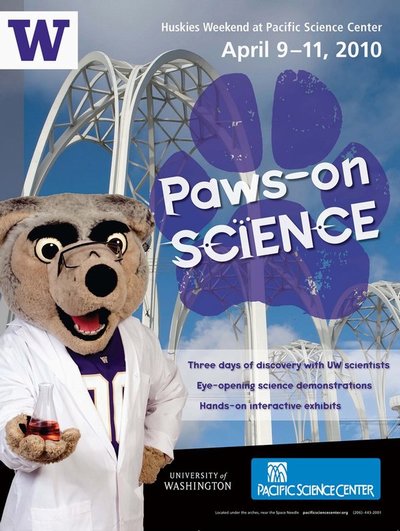April 8, 2010
Faculty, student talents will turn out for Paws-on Science: Huskies Weekend, April 9-11
Warren Buck is a well-known physicist and professor, and was UW Bothell’s first chancellor. But this weekend will bring a different role — he’ll be discussing the very building blocks of the universe at Paws-On Science: Huskies Weekend, a special three-day event at the Pacific Science Center, April 9-11.
Paws-on Science is hands-on science for Dawgs, you might say. Presented by the UW Alumni Association, the weekend event, Friday through Sunday, will feature family-friendly activities, games and demonstrations — all designed to explain scientific work and achievements of the UW. And for good measure, the Husky Marching Band is expected to make an appearance.
Presentations reflecting UW research in many areas will fill the three-day Paws-on Science calendar of events. Want to see a smart window that blocks out sunlight in the summer but lets it in during the winter? Or meet Mason, a dog who excels at the job of sniffing out the scat of certain animals? Or maybe sit behind the wheel of a student-designed and built race car?
Or you could learn about nanotechnology, climate observation or disease-battling viruses. Or maybe you’d be interested in light bulbs of the future, health-promoting comic books or how our garbage tells the story of our culture.
For his part, Buck will host an exhibit about the connection between the smallest objects in the universe with the largest ones — subatomic particles and the stars. “Quantum chromodynamics (QCD) and its use of quarks (smallest massive particles known outside the leptons such as the electron) enables one to build nuclei such as protons and neutrons as well as alpha particles, for example,” Buck explained. “And stars’ compositions are made of nearly every form of nuclei. We can also use QCD to study those particles that exhibit spontaneous decay.”
Buck illustrates this with a game he invented about 15 years back “while trying to find a way to describe to young students just what I research on” and used when visiting middle schools. He calls the game “It Really Does Matter.” He explained: “With this game, using ordinary Legos, anyone can pick up quarks and build a proton or a pi meson or a nucleus, for example — thereby gaining a better understanding of subatomic physics and how it relates to larger things we experience in our daily lives.”
Here are just a few of the UW people tentatively scheduled to attend all three days of Paws-on Science, and a brief description of what they’ll have to share. You can learn more about this celebration of UW science online here
- Boris Blinov, assistant professor of physics, will discuss developing computers based on quantum physics, which Einstein called a “spooky” science.
- Dan Jaffe, professor in UW Bothell’s Science and Technology Program, will discuss the causes of pollution and show a demonstration of the Greenhouse Effect.
- MariAnna Cara of the Joint Institute for the Study of Atmosphere and Ocean, will engage visitors in creating their own mini-tsunamis and climate observation network, and you can watch an undersea volcano erupt.
- Sara Jane Webb, research assistant professor of psychiatry and behavioral sciences, will discuss autism and visitors can test computer games that give a glimpse into how children understand the social world.
- Joel Chamberlain, research assistant professor in genetics, and Lindsey Muir, research associate in neurology, will present Not All Viruses Are Bad, a look at how UW scientists hope to find a treatment for muscular dystrophy by using tiny viruses to fix muscle cells.
- Student Ryan Trickett and others will show off the Department of Mechanical Engineering’s student-built race car, and visitors can take a turn sitting behind the wheel.
- Dan Ratner, assistant professor in bioengineering, will present “Be a Germ Detective,” showing how light helps scientists detect germs.
Here are some of the UW people tentatively scheduled to be at Paws-on Science for one or two days of the event.
- Sooyeun Kim, research associate with the Department of Mechanical Engineering, will show off the aforementioned smart windows that regulate how much sunshine comes through depending on the time of year (Friday only).
- Carl Sander and Lizbeth Louderback of the Burke Museum will present The Secret Life of Dirt, revealing how the dirt and garbage people have left behind help archaeologists reconstruct how people lived in the past (Friday only).
- Carly Vynne, a doctoral student in biology, will be on hand with scat-detection dog Mason, who will demonstrate his uncanny searching skills (Saturday only).
- Kelly Edwards, associate professor of bioethics and humanities, will present Our Planet, Ourselves, a look at how factors in the environment can make us healthy or sick.
Several of the presenters have, like Buck, created games that illustrate scientific points or processes.
- Rebecca Logsdon, research professor in psychosocial and community health, will offer games and other activities that show how exercise, friends, food and sleep can affect health and happiness (Friday through Sunday).
- Jacqueline Pickrell, assistant professor in public health sciences, will have a video game to help improve children’s dental habits (Friday through Sunday).
- Anne-Mette Peters of the Institute of Translational Health will have a game called The Order of Science, which shows how researchers turn a great idea into something useful, like a medication.
Tickets for Paws-on Science: Huskies Weekend at Pacific Science Center will be $11 for general admission, $9 for seniors, $6.50 for youth age 6-15 and $5.50 for children. UW faculty, staff, students and alumni will get a 20 percent discount on admissions. And members of the UW Alumni Association receive the same discount on all Pacific Science Center memberships.
Oh, and since so many from the UW community will be on hand at the Pacific Science Center this weekend, the center’s arches will be turned purple for the occasion — so you’ll feel right at home.

